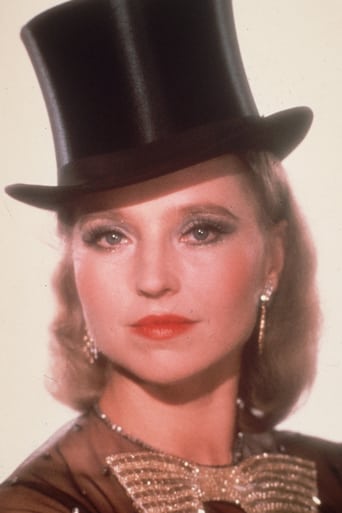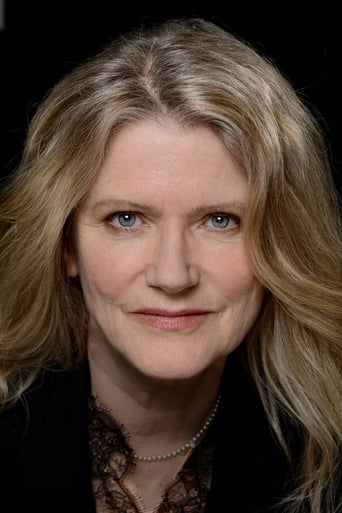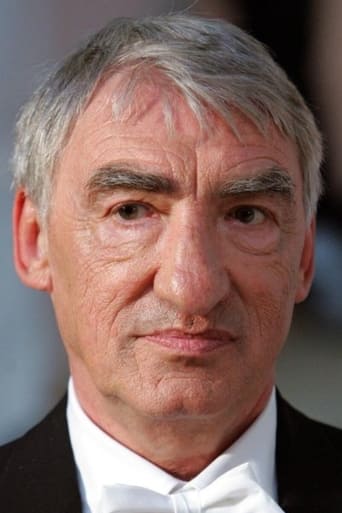StunnaKrypto
Self-important, over-dramatic, uninspired.
Supelice
Dreadfully Boring
Lollivan
It's the kind of movie you'll want to see a second time with someone who hasn't seen it yet, to remember what it was like to watch it for the first time.
Hadrina
The movie's neither hopeful in contrived ways, nor hopeless in different contrived ways. Somehow it manages to be wonderful
abrito1953
Following the critics I had a great expectation about this movie. After seen some episodes, on DVD television version, I was boredom. The development is linear and it is impossible to get any real insight about Germany on years 20. Despite Germany depression after WWI there were a lot of livid cabaret, as Weil and Bretch show us, but the music for the movie is unbearable, maybe this was the Director intention move spectator from the comfort through a limited music and dark photography. The main character Franz is too psychotic as the women around him too. I enjoyed "M Dusseldorf Vampire" , a Fritz Lang masterpiece and which tell us more about the Germans fear before WWII than this long Fassbinder. The high is the photography, most of it on small room on dark scenes.
Dr Jacques COULARDEAU
Nothing can be more melodramatic than German melodrama, particularly that of the beginning of the 20th century. Franz Biberkopf's story is such a deep, thick and sickening melodrama and Fassbinder makes it so dense, so heavy that we are totally overwhelmed by this hardening cast-plaster, a melodrama contained between Biberkopf's release from the prison where he has spent four years for killing his girlfriend, Ida, to the end of his life as a concierge in some factory after the trial in which he is a witness against the accused, his friend Reinhold who had assassinated Franz's last girl friend Mieze, after he was released from the mental institution to which he had been committed after the crime. Biberkopf is the perfect victim who is ready to do anything he is asked to do by the people he considers his friends at the moment of the request. He is totally dependent on women and at the same time reveals he is very particular about them and actually loves only very few. Eva of course, his permanent love who lives with a rich Herbert and carries his child for a few months. Ida, who he killed out of rage one morning. And Wieze who will be killed by Reinhold. The second characteristic of Franz Biberkopf is that he has the brain of a beaver, as his name implies. He is not very swift but he is faithful and he can suffer anything from his friends, though at times he may be taken, over by a fit of rage that makes him blind and murderous, though he can easily be stopped. But to survive in Germany in 1928-29 he is doing what he can, anything he comes across: selling newspapers, including the Nazi newspaper, selling erotic literature, selling shoelaces, being part of a gang of thieves, and being a pimp. Then the whole story is nothing but details of a sad ,life that can only be sad. Fassbinder makes it so dense, so packed with hefty details and events that we don't see the thirteen episode flying by. And yet the masterpiece of this long series is the epiloque. Then Fassbinder describes what is happening in Biberkopf's mind after his seizure of insanity when he realizes his Mieze was killed by his supposedly best friend who had caused him to lose an arm when this Reinhold had tried to kill him, the infamous Reinhold. In this epilogue, Fassbinder becomes the most baroque, or even rococo, of all screen artists you can imagine. He brings Biberkopf down into the deranged world of his insanity. He is cruder than Bosh, crueler than Goya, and he depicts the physical dereliction to which Biberkopf is reduced in that mental institution, the haughty condescending carelessness of doctors and personnel, and the haunted mind of his. And in this haunted nightmare he experiences, Fassbinder shows how he is tortured by Reinhold and a few others who have used him in life, how he is tortured by both his lubricity and his refusal to acknowledge it, how he is physically tormented in all kinds of cruel physical punishments repeated ad eternam, a vision of hell borrowed from Dante of course. The point here is that Biberkopf will come out of the institution when he reaches some personal peace in that insanity, in no way the consciousness of his own victimization, but a dull taming of his inner world into a senseless, meaningless and emotionless routine that will transform him into a faithful and reliable concierge looking after cars, lost and abandoned forever in his blessed solitude of the body and the soul. This epilogue is luxuriant and so dense that we just wonder how it could go on like that, over and over again, each situation of victimization opening onto another as naturally as a door you push open and drop closed behind you. Sickening and thickening at the same time, so that you feel totally buried in that grossness and in that cruelty. You are becoming Biberkopf and at the same time the torturing insanity because Biberkopf appears to you as deserving his fate, his insanity, hence your scourges and your violence. It is amazing at this moment to see how Fassbinder manages to make you be a double voyeur and transport you both into Biberkopf himself who cannot rebel in spite of you inhabiting him with the justification to rebel, and thus into the torturing insanity to punish him for not rebelling or to incite him to rebel. The only film-maker Fassbinder can compete with in this perverse mediatic transfer is Clive Barker in his early films or in his Hellraiser series, except that Fassbinder adds an ancient Greek dimension to that delirium that is vital since it will lead Biberkopf to surviving in a mixture of the International, patriotic sings and emerging Nazi military rites, rituals and marching beating tempos.Dr Jacques COULARDEAU, University Paris Dauphine, University Paris 1 Pantheon Sorbonne & University Versailles Saint Quentin en Yvelines
votarus4
Now that the holy grail of modern film is on DVD, finally and firmly in hand, we can take a close look at that thing called "Berlin Alexanderplatz." The famous Fassbinder shot is used throughout—actors revealed in hot lights through darkened doorways; as well as the ever present vertical lines slicing the screen like prison bars. Much of the film is shot with internal framing techniques, and when not, there is the broad expanse of Franz Biberkopf's apartment—a loft-like, two-level stage where threatening lights are constantly pulsating. Berlin Alexanderplatz may be a 15½ hour film, but it is played out theatre-style in Fassbinder's mental proscenium. In the heart of Berlin we wander with Franz, cages within cages, where realpolitik takes a back seat to survival. A crass, capitalistic jungle where more than 600,000 people have been thrown out of work in a matter of months (1928), is home to whores, pimps and thieves who have plenty to eat and drink. Our hero, Franz Biberkopf, fondly reminisces about Rosa Luxemburg. But this Berlin is not the workers' paradise that the great social revolutionary dreamed of and was then executed for. Is that perhaps her secret, broken down printing press in the middle of Franz's apartment, never touched or even casually mentioned? Fassbinder and Franz seem to reject all politics, left or right, and abandon themselves instead to the Weimar melodrama of instant gratification and the much replayed nightmare of a horrific crime. After our hero careens out of prison, where he has spent four years paying for the murder of his hooker-girlfriend Ida, he stays as drunk as possible, and despite his vow to live a good and upstanding life, draws into his orbit a string of women who love him obsessively and whore for him happily. His life force is irresistible, but he'd rather make his own, if clumsy, way. Franz soon finds himself in the ridiculous position of hawking a Nazi pamphlet he does not care about, the "Beobachter," while his socialist friends watch on in horror. That is, his socialist friends who are well connected to the local crime lord, Herr Pums, and are eager to have Franz join in on their sub-capitalist, black market enterprises. And then, as destined, Franz meets his soul-mate and nemesis, Reinhold. The ensemble acting of Berlin Alexanderplatz is miraculous, as is the iron grip Fassbinder had on his material. Günter Lamprecht as Franz truly does inhabit one of the screens all time great characters. The canvas is gigantic and his plodding, bearish performance with roller-coaster peaks and valleys often turns on the dime. Likewise, Gottfried Johns' Reinhold is Franz's seductive, sexy, utterly nefarious foil. All the women are memorable, especially Barbara Sukowa, Hanna Schygulla and Elisabeth Trissennaar. Don't miss the outrageously costumed Frau Pums (Lilo Pempeit), who also happens to be Fassbinder's real-life mother. We've waited 25 years to revisit Fassbinder's great Passion Play, Berlin Alexanderplatz. Definitely not for the squeamish, but rejoice and spread the word. P.S. The epilogue, which bothered me in 1983, has fully redeemed itself. It's not just a director indulging in every fantasy of his alter ego, but an earnest, if unfettered, look at Biberkopf's mind flying apart. Fassbinder ties the huge story up neatly and gives Hanna Schygulla's Eva some fantastic scenes in the process.
swillsqueal
Very long (15 hours in all), very worth seeing. Based on Alfred Doeblin's novel of the same name, "Berlin Alexanderplatz" is set in and around Berlin during the Weimar Republic era, the decade immediately preceding the establishment Hitler's Third Reich in 1933. The workers of '20s Berlin are taking it on the chin. Mass unemployment reigns alongside the greed of the landlord and capitalist classes. People are reacting and acting in various ways to survive. As usual, some of the unemployed turn to crime; others to prostitution. Most of the film's cast will see the dawn of the "thousand year Reich" with their eyes only half way open.But life must go on and it will go on and it does go on in Berlin during Weimar. It's an exciting time as well, a time when the puritanism of the countryside is being exchanged for a chance to live free and wild in a sleepless city chock full of cabarets and kniepe. Of course, the Nazis didn't like this and neither did their supporters, the conservative majorities of rural Germany.As the film's director,R.W. Fassbinder put it,Doeblin's novel,BERLIN ALEXANDERPLATZ, "offered a precise characterization of the twenties; for anyone who knows what came of all that, it's fairly easy to recognize the reasons that made the average German capable of embracing his National Socialism."All this turmoil and potential for explosive change are seen by the audience of "Berlin Alexanderplatz" through the eyes of one guy, Franz Biberkopf. Walk, ride, rob, love, drink and despair with Franz Biberkopf. Best bring along a case or two of good lager while you're immersing yourself in the prelude to "Gotterdamerung".





